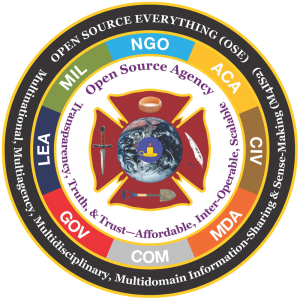
Open Innovation or Co-creation and Coexistence of Business Models
Continue reading “Jean Lievens: Open Innovation or Co-creation and Coexistence of Business Models”

Putting the Steele into intelligence reform
Robert Steele is one of the more interesting writers on intelligence. Based in the US, and a former practitioner he has brought an enormous amount of energy to the questions around intelligence effectiveness and intelligence reform, and can rightly be thought of as a grandfather of the open source intelligence movement, and more recently the expanded “Open Source Everything” meme. I should insert the health warning that he has appeared in the Companion guide that Mike Goodman, Claudia Hillebrand and I edited, so I am not entirely impartial on this, but I would place myself as a ‘critical friend’ of his work.[i]
He has recently published a semi-manifesto piece about US intelligence and it can be found on this link. I have distilled the following key points from it, that I want to write around briefly here, but the original piece is where his take on these issues sit, obviously: 1) intelligence should be about decision support; 2) intelligence is currently being justified along the lines of the quantity of secrets it produces the Executive without regard to the total government need; 3) there is a dominant discourse that only secret intelligence agencies are equipped to ‘do’ intelligence; 4) Parliament and politicians in general desperately need intelligence qua decision-support, sense-making applied to all information secret and open that applies to their functional domains; and 5) the public desperately needs intelligence, again in the form of decision support. Recently the public has become the object – Americans would say the target – of intelligence agencies, which is quite the opposite of the public being a virtual intelligence network in being, contributing to national and public security more effectively by leveraging the creative commons approach to information, what some call collective or co-intelligence.[ii]
Continue reading “Rob Dover: Putting the Steele into intelligence reform”

Google Head of Open Source Opens Up
Google and open source have worked together since the search engine’s inception and it has contributed to its success. Tech Radar hosts an interview with Google’s head of open source Chris DiBona about how Google uses open source, how it has shaped the company, and how Google has changed the face of open source: “How Open Source Changed Google-And How Google Changed Open Source.”

Wall Street Analysts: Bitcoin Could Revolutionise the Non-Financial World Too
Bitcoin technology has the potential to revolutionise the way we buy and sell property, enforce legal documents and even place bets, according to a new report from financial services and investment firm Wedbush Securities.
The system of decentralized trust, meaning that there is no central authority, that underpins bitcoin could have applications beyond the payments world that is most commonly associated with the cryptocurrency, write the report’s authors Gil Luria and Aaron Turner. The report reads:
“We see the potential for bitcoin technology to digitize and decentralize trust. The implications of eliminating the need for centralized trust may go beyond payment networks to areas such as securities markets, sports gambling and even legal contracts.”
The report, titled ‘Digitizing Trust: Leveraging the Bitcoin Protocol Beyond the “Coin”’, cites the Bitcoin Foundation’s October decision to allow meta data to be embedded in the blockchain as opening the door for people to “leverage the blockchain protocol in other ways beyond traditional financial transactions”.
See Also:

10 predictions for open source in 2014
Jack Wallen lists 10 reasons why he believes 2014 will be a banner year for Linux and open source.
The year 2013 was a solid year for open source. There were plenty of highs and certainly a few lows. However, I believe that Linux — continuing to build on its solid groundwork — will have the best year yet in 2014.

Some of you may be shaking your heads at yet another prediction of world domination by a Linux zealot. But there are plenty of reasons for such a bold prediction. In fact, here are 10 reasons why I firmly believe 2014 will be a banner year for Linux and open source:
LIST ONLY
1. Open source will dominate corporate data
2. Valve will prompt OEM hardware developers to open up
3. The Linux tablet will finally see the light of day
4. GNOME 3 will become relevant again
5. KDE will release a major game-changing feature
6. MariaDB will begin to make inroads to usurping MySQL
7. Open source will lead the way for smart machines
8. Open source will re-define cloud management
9. Linux desktop will break double-digits in the market share
10. Linux pre-install sales will steadily increase

See Also:
Open Source Everything List & Book

Seven Job Creation Strategies for Shareable Cities
The sharing economy offers enormous potential to create jobs. Sharing leverages a wide variety of resources and lowers barriers to starting small businesses.
Cities can lower the cost of starting businesses by supporting innovations like shared workspaces, shared commercial kitchens, community-financed start-ups, community-owned commercial centers, and spaces for “pop-up” businesses.